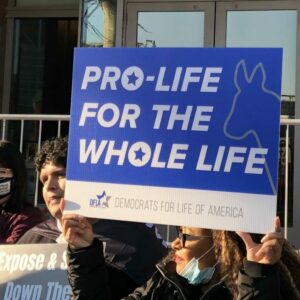New Hampshire’s Roman Catholic Diocese is not taking part in the annual March for Life, the largest pro-life demonstration in the country, citing concerns over the COVID-19 pandemic.
“The Diocese of Manchester recently decided to not organize a large, diocesan-wide contingent to attend the March for Life in Washington, D.C., primarily due to the difficulty of monitoring and mitigating the COVID-19 risk with a group of over 100 participants,” said Bevin Kennedy, the diocesan cabinet secretary for communications.
The decision means that individual parishes that once booked seats on buses the dioceses chartered for the trip to Washington D.C., and secured hotel rooms through diocesan reservations, were left to scramble to make their own accommodations for this year’s trip.
The March is scheduled for Jan. 21, to be close to the Jan. 22 anniversary of the Roe v Wade United States Supreme Court decision being handed down. Claire Pullan, with the March for Life national organization based in Washington D.C., said she’s heard from some groups that normally take part that they are worried about the pandemic.
“People are concerned about what COVID is doing, and what role that’s going to play this year,” she said.
The March organizers are telling people to take the pandemic seriously and take sensible precautions to keep themselves and others safe. The larger problem connected to the pandemic is the costs for the trip. Many groups that relied on charter buses to get down to Washington D.C. are finding the trip costs have effectively doubled.
Because of the COVID-19 restrictions, many bus companies are requiring social distancing in the bus, leaving half the seats empty. Pullan said a group like a school or a church that could charter three buses in past years now has to charter six because of the restrictions.
“There are more costs because of COVID restrictions, and a lot of people are calling,” she said.
The march usually draws hundreds of thousands of activists to participate, but it is hard to guess how many might take part this year, Pullan said. Last year’s march was converted to a virtual event because of the pandemic, and it is not clear if the continued COVID-19 surge will continue to keep people away. Pullan thinks people might want to show up this year especially after dealing with the pandemic for so long.
“People are recognizing the need to stand up,” she said.
Kennedy said the Diocese is encouraging people to attend smaller, local events to mark the occasion and is encouraging individual parishes to hold their own events.
This year’s event comes as many in the pro-life movement believe the controversial Supreme Court decision creating a nationwide right to abortion, Roe v. Wade, may be overturned or significantly curtailed by the Court sometime next year.
New Hampshire Democrats, many of whom support an even more extreme pro-abortion position than the trimester system laid out in Roe, are hoping a backlash on the abortion issue will help them avoid a 2010-style wipeout in next year’s midterms.
However, a new NHJournal poll found that abortion was named as the top issue by just four percent of Granite State voters.




